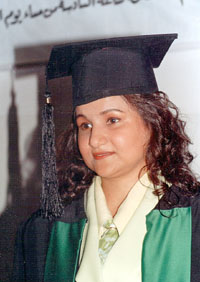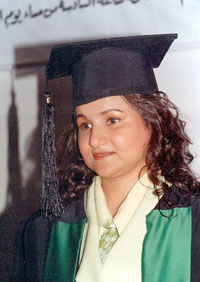
Wahi Lukman, Symbol of Strong will and Determination [Archives:2000/43/Culture]
October 23 2000

Ridhwan Al-Saqqaf
Aden Bureau Chief
Dr. Wahi Farooq Lukman, a teaching staff member at King Abdul.Aziz University- Faculty of Administration and Economics, in Jeddah, is a model person who struggled to make her dreams come true. She is the first person to get a doctorate after the late Taha Hussain. Dr. Wahi lost her sight at the end of intermediate school, She continued her study and finished high school, then university until she got her doctorate to be the first Arabic woman to get a university degree of the highest level.
I found the years passing by and my sight was declining. I woke up for the fact that I was threatened of losing one of the many blessings of God. These were the words of Dr. Wahi as we started the interview with her.
At the beginning of the interview she told the Yemen Times that she started searching for another way of life as a compensation for her lost sight and that she knew she will face many difficulties, but she was determined to challenge and overcome them. She also said that the real test was to defeat her disability and turn it into success . Dr. Wahis sight started declining at the age of 12 and she lost it completely at the age of 18.
Q:. Could you tell us how your school life was?
A: I studied in ordinary schools until high school where I got the prize of the model student. Then I joined the university of Sanaa – the faculty of law. I graduated with honors Despite the advice of many people I decided not to stop and continue my study. So I traveled for Amman in the Hashemite kingdom of Jordan . After two years I stood to defend my dissertation for the masters degree in 1991. The university of Cairo was my next stop where I defended my dissertation for the doctorate in 1998. The dean of the university attended the discussion and he congratulated me as the first blind to get a Ph.D. in the law of trade.
Q: How did you manage to read?
A: I depend on other people to read for me and listen to recorded tapes. I read daily and feel rather lost if the day passes without reading. The worst moment is when I dont find someone to read for me.
Q: Why did you choose to teach?
A: Many reasons made me choose teaching as a profession. The main reason is being fond of research and the university is one of the few places that provides us with such facility. The other reason is my wish to pass knowledge to others, this makes me feel how helpful I could be to others. Another reason is the happiness I feel to see the gift God has given me of being able to teach without needing papers to read.
Q: Have you ever considered practicing law?
A: No , I havent . Because, the degree I hold enables me to teach at the university which was the dream of my life and I dont tend to work in courts of law, but I dont mind being consulted.
Q: How do you find your relationship with your students.
A: Our relationship is based on mutual respect. They all show me high appreciation and cooperation which reflect their decent manners . They also made feel as if I werent new to them.
Q: What are your ambitions?
A: Im about to start new researches to a be professor. I also want to have a consultation office, if I find the chance.
Q: Have you ever had difficult or embarrassing situations.
A: In fact , Ive never had an embarrassing situation before, but Ive always had to explain my situation to the students because it doesnt show on me and theyve always reacted positively. I would like to extend my thanks to my dear companion Rahima who always has helped me to behave with full trust and confidence.
Q: How do you prepare notes and exam papers? And who helps you in this?
A: Before I give the lecture at the university , I prepare it at home where I have someone to read for me. I also listen to video recorded lectures of those teachers who have vast experience and have their lectures recorded on video cassettes. Ive also asked some people to record some important books on tapes for me which I listen to whenever I need.
I mark exam papers after someone like Rahima reads them for me as they are even with the spelling mistakes then I give the mark for each paper.
Q: How do you spend your day in the university?
A: I teach for 18 hours a week. I spend some time in my office to meet students and answer their questions and in my free time I meet my colleagues in the same college or in other colleges. I do all that with the help of Rahima who checks the attendance for me and does my paper work.
Q: How do you spend your time outside the university?
A: I stay in the university until three in the afternoon. Then I resume my work in my study at home at five. Then I ask somebody to read the newspapers for me. I prepare my notes for the next day until nine. Then I sit with my family, and then I go to bed. At the weekends I visit relatives and friends and do some sports.
* The complete abiding by the measures and clauses that ensure respect or impartiality of the judges in case they are accused of incompetence, preventing them from continuing in the case, and taking stern action when they cause any harm to one of the disputed parties due to their mistake. In addition, the terms related to measures and clauses should be applied of the judges partiality is proved and measures be taken to penalize him, or prevent the judge from arbitration.
* There must be, enough guard for the judges to ensure their safety against any assaults or threats. This is very necessary because of the present situations in the country.
* Dealing with the aggressions on judges firmly and seriously and considering them as crimes against the State and the security of the whole society and as one of the public opinion issues.
* Drawing the attention of the State, through media, to any assaults or offensives against judges to provide the required public protection for the autonomy of the judicature and alerting the society to chase the offenders and take them to courts.
* All authorities must be alert not to accept any requests or intercessions relating to appointing people as judges or appointing them in certain places permanently, transferring them or deputizing them. These requests must be strongly rejected. This should be done to consolidate the true principles of building the State of order and law and to guarantee the autonomy of the judicature. The violators must be sued before the Supreme Judicial Council.
* Abolishing the forms of the subordination of the judicature to the Executive Authority in the governorates. For judges should not be members of committees that are formed in governorates and should not be members in executive councils in it or department. Furthermore, the courts should be independent in its administrative, and financial affairs from being subordinate to the governorate or Division.
The judge is the cornerstone in the judicial reform process and autonomy of the judicature and in justice. There are scarcely cultured, competent and good ones. There is a bad distribution of judges among the different kinds of courts. To carry out the judicial reform process in our country, the following must be done:
* Those who would be appointed as judges must be well-chosen.
* Their legal, judicial and cultural knowledge must be of a high level.
* Jurisprudence, legislation and interpretative judgment resources must be available.
* Judicial stability must be achieved through appointment judges, transferring, and promoting them during prescribed periods. This must happen according to the results of the Judicial Investigation and evaluation of judges competence and behavior. The settlement of the judges family affairs must be considered while making the judicial reform movement.
* The salaries and allowances of the judges must be risen to to the level to ensure that they do not suffer financially and consequently ally the possibility of being corrupted.
Surely, the judicature has an effective role in abolishing corruption in the society but this requires great efforts.
The problems facing execution of the judicial acts and laws and prolonging the cases in courts for years are so many. Some of them are: the court does not abide by the terms of execution procedures and the ways of appeal. Some courts make it easy for the litigant to appeal cases in which appeal is not permissible. Another problem is the difficulty to arrive at the locations of execution. The non-existence of judicial police is also a problem. There is no draft of laws that controls the relationship between the police and the judicature. The intervention of some influential authorities and their hindering the execution is a problem that deprives the people who won the case from benefiting from the verdict. One of the fruits of the verdicts is the execution of verdicts. Prolonging of procedures is another problem.
——
[archive-e:43-v:2000-y:2000-d:2000-10-23-p:./2000/iss43/culture.htm]


